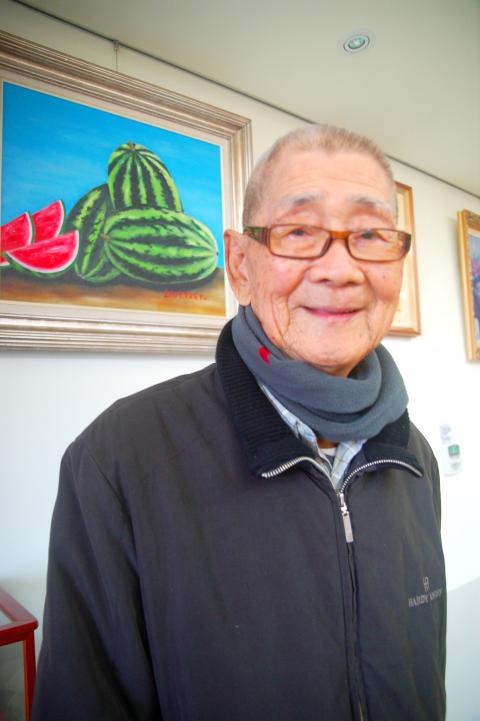Chen Wen-yu (陳文郁), supplier of nearly 25 percent of the world’s watermelon seeds, died on Dec. 7 at the age of 88.
A funeral service for Chen, who developed the world’s first seedless watermelon in 1962, is scheduled to be held tomorrow in Greater Kaohsiung.
Chen earned the name the “Watermelon King” because he produced more than 200 varieties of watermelons during his 44-plus years in the business.

Photo: Hsieh Wen-hua, Taipei Times
“My goal is to create the world’s most delicious watermelon,” he once said. “If you taste such a watermelon, you will not seek other watermelons.”
Born and raised in a rural village in Tainan’s Yongkang District (永康), Chen was very aware of the hardship farmers experienced and decided when he was 14 that he would study agricultural technology to help improve farmers’ lives.
With funding from the US Agency for International Development, he pursued advanced studies in horticulture at Chiba University in Japan. He later returned to Taiwan and founded the Kaohsiung-based Known-You Seed Co with his friends in 1968.
The name “Known-You” can be transliterated as “friends of farmers” in Mandarin.
Chen’s company focuses on developing new varieties of watermelon seeds, but has also created more than 500 new vegetable and flower varieties.
“It takes good seedlings to produce good varieties. We provide farmers with good seeds to help them reap better harvests,” he said.
These seeds “are provided to farmers in Taiwan and around the world,” the company said in a statement after Chen’s death.
The company has a seedling farm in the US and branch offices in China, India and several Southeast Asian countries such as Singapore and Thailand.
Chen also set up a foundation to help improve local farmers’ welfare and funded the establishment of a hospital in Myanmar to provide free medical services for farmers there.
In recognition of Chen’s contributions to agriculture and farmers’ welfare, President Ma Ying-jeou (馬英九) last year conferred on him the Order of Brilliant Star with Violet Grand Cordon.
Chen was also featured on the Discovery Channel in 2006 as one of six most influential Taiwanese.

DEFENSE: The National Security Bureau promised to expand communication and intelligence cooperation with global partners and enhance its strategic analytical skills China has not only increased military exercises and “gray zone” tactics against Taiwan this year, but also continues to recruit military personnel for espionage, the National Security Bureau (NSB) said yesterday in a report to the Legislative Yuan. The bureau submitted the report ahead of NSB Director-General Tsai Ming-yen’s (蔡明彥) appearance before the Foreign and National Defense Committee today. Last year, the Chinese People’s Liberation Army (PLA) conducted “Joint Sword-2024A and B” military exercises targeting Taiwan and carried out 40 combat readiness patrols, the bureau said. In addition, Chinese military aircraft entered Taiwan’s airspace 3,070 times last year, up about

Taiwan is stepping up plans to create self-sufficient supply chains for combat drones and increase foreign orders from the US to counter China’s numerical superiority, a defense official said on Saturday. Commenting on condition of anonymity, the official said the nation’s armed forces are in agreement with US Admiral Samuel Paparo’s assessment that Taiwan’s military must be prepared to turn the nation’s waters into a “hellscape” for the Chinese People’s Liberation Army (PLA). Paparo, the commander of the US Indo-Pacific Command, reiterated the concept during a Congressional hearing in Washington on Wednesday. He first coined the term in a security conference last

A magnitude 4.3 earthquake struck eastern Taiwan's Hualien County at 8:31am today, according to the Central Weather Administration (CWA). The epicenter of the temblor was located in Hualien County, about 70.3 kilometers south southwest of Hualien County Hall, at a depth of 23.2km, according to the administration. There were no immediate reports of damage resulting from the quake. The earthquake's intensity, which gauges the actual effect of a temblor, was highest in Taitung County, where it measured 3 on Taiwan's 7-tier intensity scale. The quake also measured an intensity of 2 in Hualien and Nantou counties, the CWA said.

The Overseas Community Affairs Council (OCAC) yesterday announced a fundraising campaign to support survivors of the magnitude 7.7 earthquake that struck Myanmar on March 28, with two prayer events scheduled in Taipei and Taichung later this week. “While initial rescue operations have concluded [in Myanmar], many survivors are now facing increasingly difficult living conditions,” OCAC Minister Hsu Chia-ching (徐佳青) told a news conference in Taipei. The fundraising campaign, which runs through May 31, is focused on supporting the reconstruction of damaged overseas compatriot schools, assisting students from Myanmar in Taiwan, and providing essential items, such as drinking water, food and medical supplies,